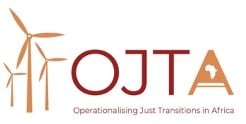
The Operationalising a Just Transition in Africa (OJTA) research project is funded by the International Development Research Centre (IDRC) and collaboratively undertaken by the Centre for the Advancement of Scholarship at the University of Pretoria, the African Research Impact Network and SouthSouthNorth. Research activities will occur over two years between July 2023 and July 2025.
With the need for accelerated global climate action in mind, the project’s research questions focus on meeting African energy access needs with a step-change investment in renewable energy. The manner and means by which these investments will be achieved provide myriad pathways. The considerations of justice within energy transitions, the socioeconomic implications for both energy and non-energy sectors and the role of finance in enabling or inhibiting scaled clean energy access make for timely enquiry.
The pursuit of Sustainable Development Goal 7 (ensuring access to clean and affordable energy) is underpinned by the global multilateral process on climate change. African countries are taking steps to meet the goals of the United Nations Framework Convention for Climate Change’s (UNFCCC) Paris Agreement. Additionally, the Continent still has significant energy access challenges to overcome poverty, and inequality and ensure a decent life for everyone. The opportunity to address these energy access needs with renewable energy is a practical means to operationalise a fundamental transition insofar as to how the Continent's energy needs are aligned with the Paris Agreement's goals. Notwithstanding the necessity of this implementation, renewable energy could provide options for considering the principles of equity and common but differentiated responsibilities and respective capabilities in the light of different national circumstances.
What are the enablers for finance to realise the Continental priorities set out in the COP 27 Africa Just and Affordable Energy Transition Initiative? Moreover, what are the just transition considerations required to operationalise at least 300 million of Africa’s population having access to clean energy and increasing Africa’s renewable energy capacity to 25% of global renewable energy investments? (COP27 Presidency, 2022: 2)
Sufficient and appropriate financing for tangible and scaled renewable energy access is paramount. Several gaps and limitations impede the Continent's capacity to operationalise energy transition pathways. Whilst taking guidance from the UNFCCC process, the project’s research audience and users are more focused on the practitioners who are seeking to scale up finance scaled renewable energy access within Africa.
With this in mind, this project seeks to support a body of evidence outlining the operationalisation of just transition considerations into renewable energy expansion at national, regional, and Continental levels alongside the role of Development Finance institutions working to enable investments. The research will focus on the elements of justice within scaled renewable energy access, the socioeconomic considerations for financing just energy transitions and the role of development finance practitioners in enabling scaled renewable energy policy targets to be met.
The project outputs will include a combination of case studies that unpack the financing arrangements from African countries embarking on transitions that meet the goals of the Paris Agreement. Journal papers will expand on these case studies to contextualise their proximity to Continental outcomes relating to renewable energy access. Complementing these papers will be a series of policy briefs focused on operationalising just energy transitions in Africa. Underpinning the research framework will be targeted capacity enhancement of the primary research audience, engagement with early career researchers alongside the impact outreach and dissemination of findings.
|
|
 |
 |
The OJTA’s research consortium comprises SouthSouthNorth, the African Research Impact Network and the University of Pretoria. This work is carried out with the aid of a grant from the International Development Research Centre, Ottawa, Canada. The views expressed herein do not necessarily represent those of research consortium members, the IDRC or its Board of Governors.
Copyright © University of Pretoria 2024. All rights reserved.
Get Social With Us
Download the UP Mobile App